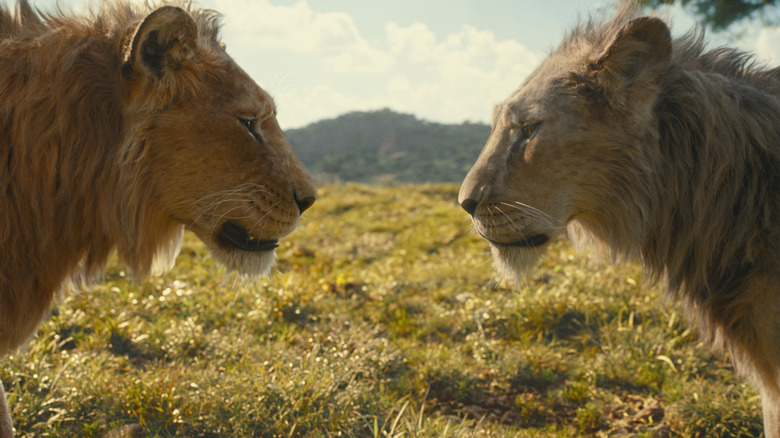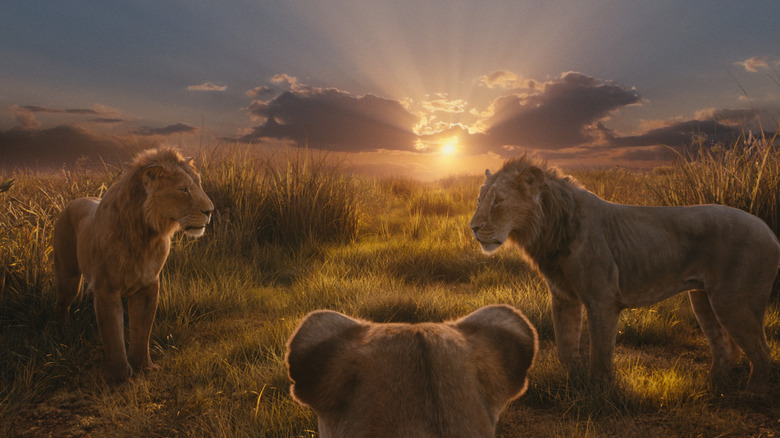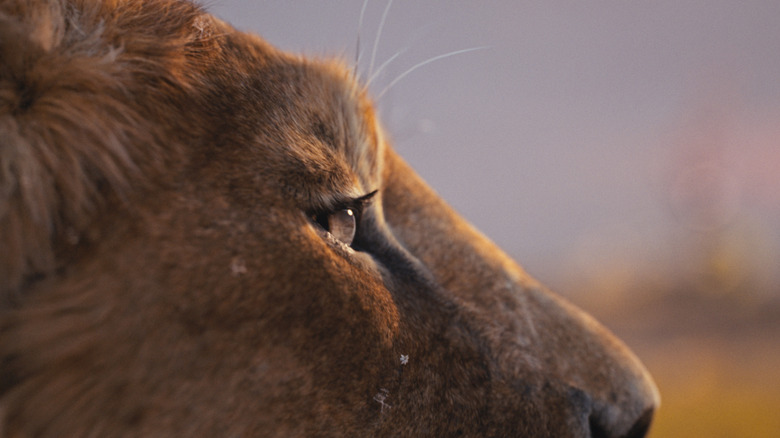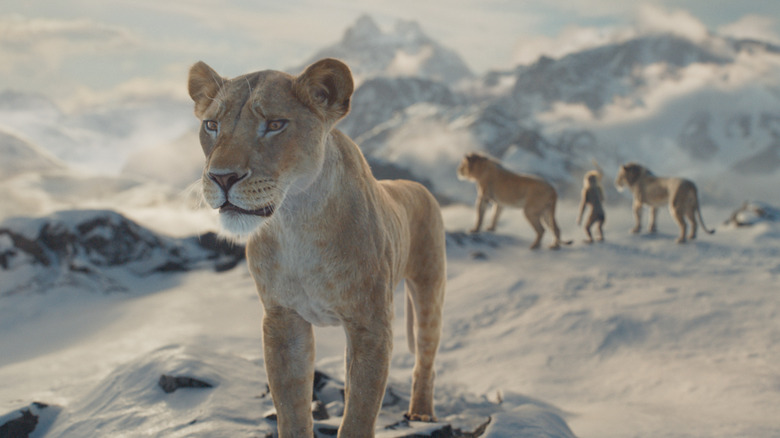
This article contains spoilers for “Mufasa: The Lion King.”
Making a prequel to any story can be a challenge. It’s a true double-edged sword. On the one hand, if you’re being tasked with telling the story before the events of an earlier one, it means that audiences responded well to the latter. It’s rare, at least, for an ill-liked or financially unsuccessful film to get a prequel, so audiences must have liked the first film enough. But the downside is that because audiences like the first story, it means that they kind of know where any prequel has to end. Even the best types of prequels struggle against this.
If you watch “The Godfather Part II,” for example, you inherently know that Vito Corleone will rise up through the ranks of the Mob to become the eponymous character of the original 1972 classic from director Francis Ford Coppola. That doesn’t mean that a prequel is automatically a bad film, considering “The Godfather Part II” itself is among the greatest films of all time. But it all depends on how you tell that prequel story, and what questions you decide must be answered. This weekend marks the arrival of “Mufasa: The Lion King” (go here for /Film’s review), a film that is perversely a bit of an attempt on Disney’s part to do its own version of “The Godfather Part II,” blending present-day action with the past to tell us the story of how Mufasa, one of the most beloved animated movie dads of all time, went from being an orphaned lion cub all the way to the eponymous character of the 1994 “Lion King” (which inspired Jon Favreau’s computer-animated remake from 2019). In so doing, “Mufasa” has answered one particular question in such an aggravating way that it feels an awful lot like another recent misbegotten Disney-backed prequel, “Solo: A Star Wars Story” (which /Film’s Chris Evangelista once described as “a highly entertaining adventure that’s not really about anything”).
You see, while “Mufasa: The Lion King” is primarily about how Mufasa (voiced as an adult by Aaron Pierre) becomes the king of Pride Rock, that also means we have to get the full story of the relationship between Mufasa and his brother Scar. As noted above, though, it’s quickly made clear that young Mufasa is not just orphaned, but he’s also an only child. Aside from the framing device — in which an older version of Rafiki (John Kani) tells the story of Mufasa’s life to his granddaughter Kiara (Blue Ivy Carter), with Timon the meerkat (Billy Eichner) and Pumbaa the warthog (Seth Rogen) along for the ride to do extended improvised riffs that are the only bright spot in the film — the movie documents how Mufasa is adopted into a different pride of lions, including his new adopted brother Taka (voiced as an adult by Kelvin Harrison, Jr.). Mufasa, Taka, a lioness named Sarabi (Tiffany Boone), a younger Rafiki, and a chatty hornbill named Zazu (Preston Nyman) make their way to a fabled paradise of sorts called Milele. On the way to this potentially mythical land, of course, Mufasa and Taka become less close with each other, as their frenemy-style relationship goes from good to bad.
Mufasa (unnecessarily) reveals how Scar got his name
Now, you do not have to be a rocket scientist to make a pretty strong guess about who Taka really is. If only by considering the Law of Economy of Characters from the late film critic Roger Ebert — wherein the existence of certain characters has to be justified by the story being told — and the fact that Mufasa is joined on his trek by three other characters who we all know from the 1994 “Lion King,” you should not see it as a spoiler that Taka is Scar. The questions that the film wants to have answered regarding this character are as simple as they are unnecessary: “Hey, why is Scar called Scar? And how did he ever get that scar across his left eye?”
The answer to the second part of that quote is handled, at least, with a little less silliness. Before Taka becomes less friendly to his adoptive brother Mufasa, they have to face off against a more serious threat in the form of a pride of white lions hoping to colonize places like Milele (and yes, that is about as subtle as the film gets with these villains). Led by Kiros (Mads Mikkelsen), this pride of lions is vicious, cold-hearted, and largely sociopathic. They not only kill Taka’s own family, but they’re also more than happy to take on Mufasa and the others. So why, you may wonder, would Taka ever turn on Mufasa and ally himself with the bad guys? Well, as it turns out, Taka has quite the instant crush on Sarabi (helpfully made clear through dialogue, since the lifelessness of the computer-animated animals’ faces doesn’t help us understand what they’re feeling or thinking). We all know, of course, that Mufasa and Sarabi end up together; once Taka gets that he’s the odd lion out, he gets vengeful and betrays Mufasa to Kiros and the others.
That’s bad enough for Mufasa and friends, but in a climactic battle, Taka seems to have a change of heart. (“Seems” is the right word to use here, because there’s no dialogue to help us better understand Taka’s choices, just soulless closeups of characters’ eyes.) Just when it looks like Kiros has the upper hand against Mufasa in a battle in a closed-in cave, Taka jumps in front of his adoptive brother and takes a bullet — er, claw — for him. Thus, a simple enough answer to how Taka got that scar. It’s only in the final moments of the film, though, when we understand why Taka’s name has changed. As Mufasa has humbly accepted his place as the king of the widespread group of animals in the surprisingly real place called Milele, he decides to be the better lion and not banish Taka for his earlier betrayal, while also making it clear he’ll never forget what his brother did to him. So, Taka offers up a peace offering: he should be called Scar now so he’ll never forget what he did to deserve the moniker. After Mufasa agrees to this, he takes his place on the remnants of the destroyed cave, aka Pride Rock, and the story concludes.
By revealing how Scar got his name, Mufasa answers a question we never bothered to ask
It’s baffling enough that “Mufasa” spends so much time with its characters talking about Milele before revealing that Milele is actually Pride Rock, but it also forgets to explain why the film’s characters never refer to Milele ever again. (Seeing as the film’s first new song, a duet between Mufasa’s actual parents, is called “Milele,” it’s even odder.) It’s doubly baffling that this story attempts to make Scar’s name and its origin something of a third-act twist. As noted above, Timon and Pumbaa are on hand to jump in at random moments of the film to ask questions, riff, and make jokes that no one else within the film seems to want to hear. (This, too, is an odd choice: Timon and Pumbaa are the height of comic relief, and yet this movie seems to loathe the fact that they’re present. Maybe that’s why the adult version of Zazu, voiced by John Oliver in the 2019 remake, doesn’t appear here — unless Oliver just didn’t want to be in the prequel.) But they also do a couple of back-and-forths about wondering who Taka really is, with the gag being that the more juvenile Pumbaa wants to act like he knows Taka’s true identity but has no clue. Whether or not the adults in the audience are all meant to guess what’s going on, the film holds back until the very end, and for no good reason.
If there’s one way the scene in which Han Solo gets his last name (a moment that Disney execs actually loved) from “Solo” fares better than the whole thing with Scar in “Mufasa,” it’s that it happens early on. It’s arguably just as ridiculous — perhaps more so because, really, did anyone ever wonder why Han’s last name was Solo any more than they wondered why Luke Skywalker’s last name was Skywalker? — but dispensed with sooner. To jog your memory: in “Solo,” as Han is on the run and attempting to go unseen, he signs himself up for military duty with the Imperial Navy. During his boarding process, the attending Imperial officer notes that he’s by himself and has no last name, so why not call him Han Byhimself? (Or, y’know, Solo.) The answer to this question, one which no one ever asked, is pretty useless in the grand scheme of things.
The same is true of what happens with Taka/Scar in “Mufasa.” You could even argue that Mufasa has made his own bed by letting his adoptive brother hang around the savanna; although we don’t see Scar strike up any conversations with hyenas, they are briefly glimpsed among the menagerie of animals living in Milele, and most of us can put two and two together about how the strange bedfellows will eventually strike up an advantageous relationship in “The Lion King.” What we do see is Scar essentially telling Mufasa that by calling himself by that new name, it will serve as a reminder of how much he resents the lion cub he helped save usurp him in the royal lineage. We can debate the original 1994 “Lion King” and how obvious it is that Scar is bad news, and that Mufasa should not be so willing to let his brother hang around. But now that we know why Scar is so resentful … well, Mufasa, you could’ve made a better choice.
Mufasa, and his movie, could have made better choices
Part of the problem is simply the concept of the prequel, especially when it’s following up to a massively popular film. (Even though this writer cannot stand the 2019 “Lion King” remake, it was undeniably, almost disturbingly successful at the worldwide box office.) But few prequels are actually successful at telling a story of beloved characters without feeling stale and almost useless. One of the rare exceptions would be the 2013 Pixar film “Monsters University,” which is a decent follow-up to “Monsters, Inc.” in part because it weaponizes the audience’s awareness of pre-existing characters to its own benefit. In that film, one-eyed chatterbox Mike Wazowski is the main character, seen desperately trying to convince everyone around him that he would be a great Scarer, even though we all know what the other characters do: Mike’s not scary. Thus, that film’s journey is as much about how Mike becomes friends with James P. Sullivan (John Goodman) as it is about how Mike accepts his personal journey can’t be the one he’s dreamt about since he was a kid.
That is, however, not the case with “Mufasa.” Even if you wanted to go in unspoiled, and even if you inexplicably didn’t know about the 1994 animated “Lion King” or its remake, you’d have a pretty good idea that Mufasa will end up as the king of the lions because … well, the film is called “Mufasa: The Lion King.” The journey here is not that surprising because it can’t really be that surprising. Would this film be any better if, say, Scar was already known as Scar when he rescued Mufasa from a raging river as a cub? And if, perhaps, Scar had gotten his scar when he was little himself, happening off-screen? At the very least, it wouldn’t be any worse. To be clear: while this film is a mild improvement over the “Lion King” remake, that is an exceedingly low bar to clear, and no matter whose name is listed as director, this feels largely as lifeless as its predecessor and a poor use of Barry Jenkins’ immense talent in live-action dramas.
If anything, the long-delayed reveal that Taka is the lion who would become Scar — and the fact that it’s treated as a reveal at all — is insulting at worst and flat-out unnecessary at best. We all know that Mufasa and Scar are at loggerheads, and that Scar sees himself as the first in line for the throne over Simba. We all know that Scar is going to use that resentment to fuel his hatred of Mufasa and his family, and kill Mufasa while pinning the blame on Simba. (If we didn’t already know that, this film depicts Scar grabbing Mufasa by the paws, a la how he kills Mufasa and nearly kills an adult Simba in “The Lion King,” twice. Just in case you couldn’t pick it up the first time.) And because we all know these things, treating it like a secret, even if it’s a coy secret whose details are known to everyone, is an absurd choice that only heightens the creative inertia at the core of this IP extension. “Mufasa” had an uphill battle to start with, but this movie only makes things harder on itself by treating the obvious like a surprise.
“Mufasa: The Lion King” is now playing in theaters.





Leave a Reply